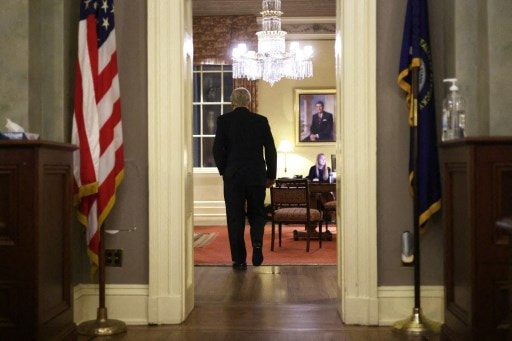By Frankie Taggart
Agence France-Presse
(AFP) — The US Senate voted Thursday to stave off a credit default that would have sparked a recession and roiled world markets as Democrats and Republicans agreed to a stop-gap fix to raise the nation’s debt limit.
The breakthrough — which temporarily defers the crisis by adding another $480 billion to the allowable debt total — came with an estimated 11 days to go until the country would no longer have been able to borrow money or pay off loans for the first time in its history.
Chuck Schumer, who leads the Democrats in the Senate, announced the breakthrough deal after fractious negotiations in Congress going into the early hours of the morning.
“Republicans played a dangerous and risky partisan game, and I am glad that their brinksmanship did not work,” he said on the Senate floor.
Republican Senate Minority leader Mitch McConnell offered the deal Wednesday as his party was set to vote against House-passed Democratic plans for a hike in the nation’s borrowing cap of more than a year.

Rather than solving the crisis, the new arrangement kicks the can down the road to coincide with another major funding deadline — a shutdown that would kick in from December 3 when the government’s coffers theoretically run out, closing federal services and properties.
“What is needed now is a long-term solution so we don’t go through this risky drama every few months,” Schumer added.
Democratic House Majority Leader Steny Hoyer said Thursday night that his chamber will vote on the debt ceiling bill and send it to President Joe Biden’s desk next Tuesday.
Biden plans to sign the bill as soon as it passes the House.
“We can’t allow the routine process of paying our bills to turn into a confidence-shaking political showdown every two years or every two months,” White House spokeswoman Jen Psaki said in a statement.
– ‘Manufactured crisis’ –
Democrats will use the brief lull in hostilities to work on their multi-trillion dollar social spending package, the cornerstone of Biden’s economic agenda.
McConnell is hoping to use Biden’s sweeping proposals to campaign against “reckless” Democratic spending ahead of next year’s midterm elections.
“The Senate is moving toward the plan I laid out yesterday to spare the American people a manufactured crisis,” McConnell said.
The lifting of the Republican blockade ends for now an impasse that risked leaving the federal government incapable of securing and servicing loans after October 18.
The United States spends more money than it collects through taxation so it borrows money via the issuing of government bonds, seen as among the world’s most reliable investments.
Around 80 years ago lawmakers introduced a limit on how much federal debt could be accrued.
The ceiling has been lifted dozens of times to allow the government to meet its spending commitments — usually without drama and with the support of both parties.
Even the threat of a default can spook financial markets and damage the economy. A first-ever actual default would have been felt around the globe.
But Republicans in both chambers of Congress have this time objected in protest of Biden’s social spending package, which is likely to have a final ticket price in excess of $1.5 trillion.
It isn’t legal to raise the debt limit to cover future spending; it could only pay for past obligations and much of the $28 trillion national debt was accrued by Republican administrations.
McConnell had been insisting since July that Democrats suspend the debt limit with no Republican help, through a laborious and partisan process known as budget reconciliation.
But he reportedly became skittish over Democratic calls Wednesday to solve the issue via the “nuclear option” of modifying the filibuster — which normally requires 60 votes to pass legislation.
– ‘Uncertainty’ –
Thursday’s legislative Band-Aid buys the Democrats time to pass a longer term debt limit extension, although they are still refusing to pursue reconciliation.
They say the process would be too complex and risky. And since it requires no help from Republicans, they worry that they will be forced to carry the political stigma of the $28 trillion-and-rising federal debt alone.
But the olive branch has left some senators on both sides of the aisle — and high-profile observers from near and far — unsatisfied.
Former president Donald Trump issued a statement from his home in Florida endorsing the Democratic interpretation of developments as a tactical retreat by the Republicans.
“Republican senators, do not vote for this terrible deal being pushed by folding Mitch McConnell. Stand strong for our country,” he said.
© Agence France-Presse
